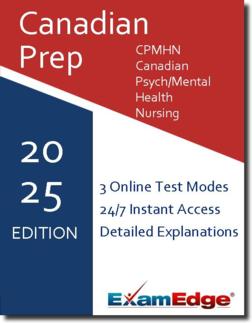CPMHN - Canadian Psych/Mental Health Nursing (CPMHN) Practice Tests & Test Prep by Exam Edge - Blogs
Based on 17 Reviews
- Real Exam Simulation: Timed questions and matching content build comfort for your CPMHN - Canadian Psych/Mental Health Nursing test day.
- Instant, 24/7 Access: Web-based Canadian Psychiatric/Mental Health Nursing Examination practice exams with no software needed.
- Clear Explanations: Step-by-step answers and explanations for your Canadian exam to strengthen understanding.
- Boosted Confidence: Reduces anxiety and improves test-taking skills to ace your Canadian Psychiatric/Mental Health Nursing Examination (CPMHN).



